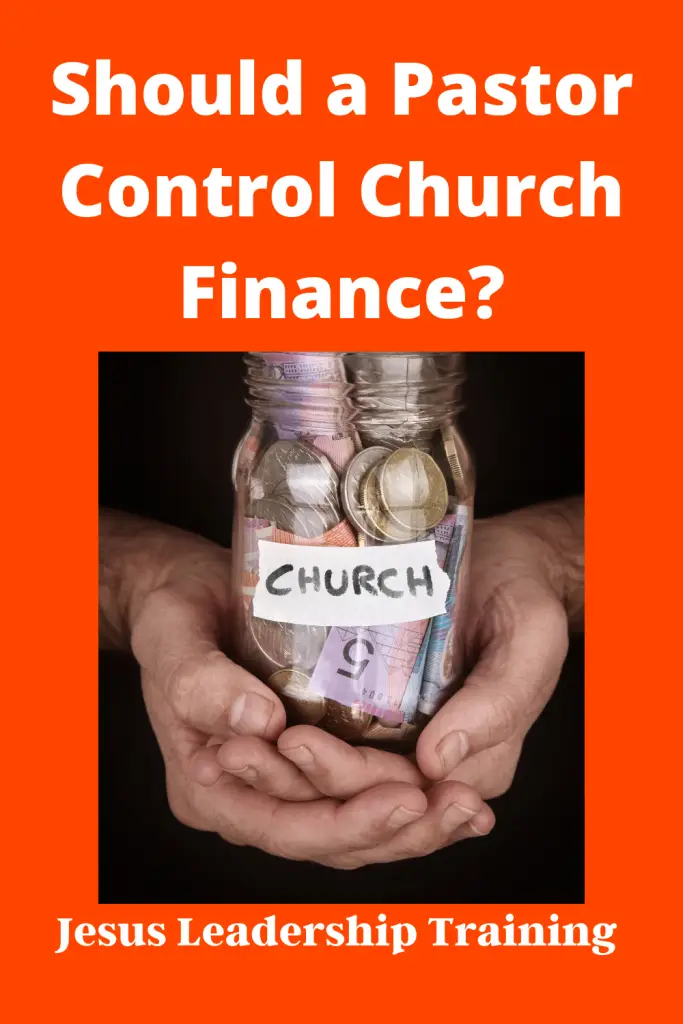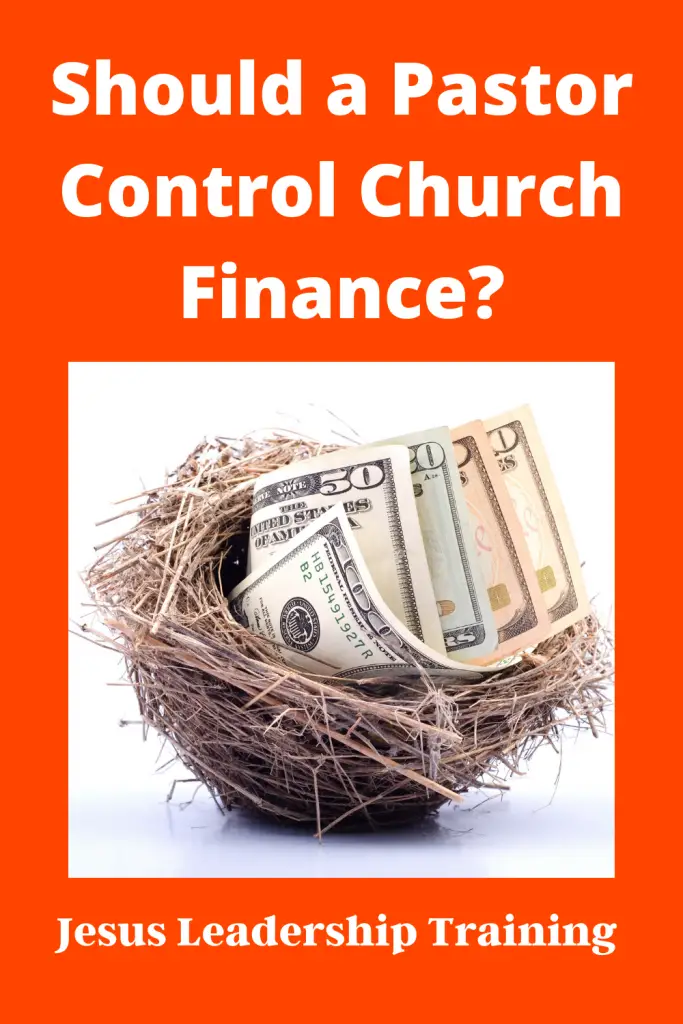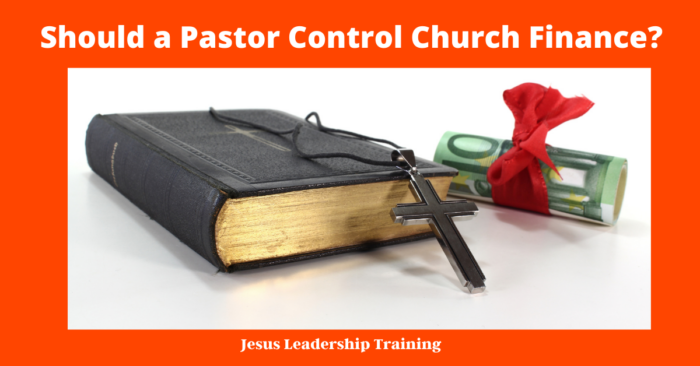Table of Contents
Pastor Spending Church Finances
Should a Pastor Control Church Finances – The subject of money has always been a delicate matter in the life of human beings. It is one of the issues where people put up the most resistance because many times it is difficult to give or give our money to others. Money is one of the main causes of conflict and disintegration in both business and family. More than 75% of the people imprisoned are due to problems related to money. Wars have been waged to obtain economic power.
In this article, we are going to talk about money and the church since many Christians often have questions such as: What does the pastor do with my money? How much can the church take from me? Should the pastor show the faithful where the church’s money is spent? These and many other questions will be addressed in detail in the following article.
How should Churches Handle Finances?
The administration of church finances is much more than counting tithes and offerings. It is an extremely delicate subject. The administration of the church can be done by one person, or by creating a special committee for that purpose, where there are different delegated functions, such as the administrator, the secretary, the treasurer, among others.

Each church has its own way and point of view on how to manage finances since the Word of God does not establish an official method. Ideally, the person who manages the money should be knowledgeable in this area, since it is important to manage financial assets wisely.
Each church should create its own work plan and elaborate a budget to know which are its fixed expenses (those that come month to month) and which are its eventual expenses (those that arise due to some special condition or circumstance that was not foreseen in the church’s plans). Depending on your members, situations, and priorities, we can distinguish between:
- Cleaning Supplies
- Office supplies
- Payment of basic services (water, electricity)
- Allowances for widows and the sick
- Allocations for Teaching and Discipleship
- Allocations for Evangelism and Missions
- Repairs and/or remodeling
- Payment of church personnel
- Other social expenses
Relevant reports and meetings should also be implemented to address each of these issues and establish solid parameters to support sound financial management. They should be done with the administrator(s), senior pastor, and leaders and address fundamental decisions that need to be fully studied.
Who makes Financial Decisions in a Church?
It has been discovered that in several churches, practically all financial decisions depend on the vote of the congregation. In others, only the pastor and some leaders know how the finances are managed and have the voting power when allocating financial resources to other areas of the church. Biblical balance is a middle ground.
Naturally, it is a rather controversial issue to decide who is going to administer the finances, precisely because the Bible does not record that the early church had expense reports or meetings related to the budget. Romans 15:25-28 and 1 Corinthians 16:1-4 reveal that the churches entrusted a leader (or group of leaders) with the finances, who proceeded as administrators. Given the lack of clear biblical instructions in this regard, some interpret this as God wanting some freedom in this area.
It is recommended that the pastor not be the one to personally manage the finances, since he is dedicated to shepherding the sheep. Of course, since he is the shepherd, he has a voice and a vote when it comes to allocating financial resources, but he should not make these decisions in a unique and personal way. Based on these findings, it is necessary to emphasize that the person or group designated to manage the financial resources should meet a series of requirements:
- Know that you are doing it for God’s work.
- Handle money that can be considered sacred
- Manage it with free conscience
- Be balanced in his office (not be manipulated or bribed by others).
- Have moral authority to do so (The same principle of 1 Timothy 3:5 about bishops applies to this person).

Who is Responsible for Church Debt?
Can a church have an assembly that oversees financial decisions? Can the church appoint one person to be in charge of all finances? Although this method lacks more transparency, there is no clear biblical prohibition, so I think yes.
Much more important than knowing who is responsible for the church’s finances should be how the church’s finances are managed. Church leaders, as well as the senior pastor, are primarily responsible for the management of the church’s resources. They should be extremely careful to manage the assets of the church in the same manner as they do in the home.
The selection of the administrator of the church’s finances rests with the congregation itself, so it is the ultimate responsibility of the church to choose who will be in charge of its assets (1 Corinthians 16:3). Note in these verses that the administrators chosen by Paul were not part of an inner circle or had relationships of cronyism or nepotism. Thus, those in charge of the money were appointed from below (the people), not directly from among the leaders.
What are the Pastor’s Duties to a Church?
The Word of God is not scarce in warning pastors about how they should conduct themselves in relation to money. There are many admonitions regarding the danger of the love of money (1 Timothy 6:9-10), greed (2 Peter 3), and dishonest gain (Titus 1:7). This is not just another issue or one of little importance. Pastors and believers should live on the fringes of scandals that may be associated with the handling of money.
Through the example of the Apostle Paul, we can deduce some duties and principles about how pastors and leaders in the church should conduct themselves in relation to money. Let us look at some of them:
- Example of contentment (Philippians 4:12-13). The purpose of ministry is not to have financial stability or to become rich at the expense of the church. God has called every pastor to serve with love.
- Transparency (2 Corinthians 8:19-21). Paul cared for his own testimony by setting a bold example of transparency and honesty when he volunteered to take the offering for the saints in Jerusalem.
- Laboriousness (Acts 20:34-35). To be a pastor of the church is an arduous work. This does not justify at all to demand or to have the right to receive money disproportionately. They should be remunerated in proportion to their function of service in the church.
- Honesty (1 Timothy 6:6-8): It is not advisable for a pastor to meddle in money matters in the church. It is not healthy for the pastor or his family to account for money or manage bank accounts or hold church property in their name.
- Be humble (1 Corinthians 3:5-7): Large sums of money are not synonymous with success and ministerial power. The key lies in the faithfulness with which one performs in leading people to Jesus Christ, who alone gives true ministerial growth and success (John 3:30).
Common Mistakes Pastors Make with Church Finances
One of the most common errors is that there are pastors who look at the ministry as a source of profit or a means to achieve wealth quickly and without problems. Almost always there are brothers who are desperate and eager to advance to the next level without measuring the consequences of the degree of responsibility that has been entrusted to them, only to receive money and not to work or depend exclusively on the church.
From the first example we can see those pastors who, although they do everything with passion and dedication, with sincere and true love, are usually paid disproportionately, with excessive sums of money, so much so, that sometimes, some services and investments in the church are sacrificed. We have already said that the retribution to the pastor should be in proportion to his function or service in the church.
In other churches, some pastors manage their finances in secret, blindly and alone or surrounded by family members with whom they often manage large volumes of wealth, behind the backs of the congregation and even civil laws. It becomes a problem when the church leadership reserves the accounting reports only for a closed group, without clearly presenting the accounts of expenses in the church. It is not healthy for the testimony of the gospel to incur in this type of conduct.
There are churches that misuse money. Sometimes, expenses exceed the allocated budget and they have to resort to debt as a method of payment to pay for services. When this becomes a habit, the people who manage the money are excessively wasteful. In other cases, there is no habit or culture of saving for future eventualities. Other churches squander economic resources on unnecessary things beyond the church’s means.
There are churches that occasionally refuse to help the brethren when they are in need or to supply the needs of the group. This is feasible in churches that are just beginning or those that are in turbulent regions, where they have to live with the limited resources they have. But it is not acceptable for the church to refuse to help a brother if it has the resources in its hand to be able to do so (James 2:15-16). Although, on the other hand, it should be done with great care, since it is only to supply a determined need for a determined period of time and not to encourage the brother’s laziness.
In other churches, on the other hand, leaders and pastors who provide a particular service to the congregation are paid little or nothing. In others, the tax authorities are cheated and the income of the community is not fully declared. Although the idea is to do it voluntarily without expecting anything in return (1 Corinthians 9:12), the work of those who preside in the Lord should be recognized with justice and pay them in proportion to their service, as well as being honest and honest with the income generated, without hiding anything for fear of third parties.

A final reason may be because of a hidden sin of the leaders or pastor of the congregation (Joshua 7:11-12). The vices, bad habits or disordered behaviors kept in secret end up taking their toll on the church and our family. Another possible reason would be because the pastor or leaders do not proceed in the work with joy (2 Corinthians 9:7), but with complaint and grumbling, even with an attitude of contempt, fatigue, and ingratitude (Deuteronomy 28:47-48).
Guidelines for Pastors spending Church Money
Pastors should prepare themselves to exercise their mission and not neglect their path. The administration of his own life, the organization of his church for the daily ministry, as well as the administration of the finances (in case the pastor is the treasurer or the administrator appointed by the church) is a decision that should not be neglected.
Managing money is about defining methods and goals, as well as sharing the privilege of the work with others. These simple steps will help you effectively organize the community money invested and avoid unnecessary expenses.
- Make a budget: This is the first and best way to organize the congregation’s money very well. This budget should reflect the most urgent priorities, as well as include long-range goals and savings for future contingencies and unforeseen events.
- Do not live on the edge: Do not spend all that is received, do not make unnecessary expenses unless it is for reasons that are absolutely necessary (James 4:13-16).
- Do not assume: There are pastors who believe that when they have excess resources in the church, they interpret it as a sign that God is giving them to squander unnecessarily. Although it may be hard to understand, God often gives resources for different purposes (Genesis 41).
- Open a savings account for the church: Encourage savings and a culture of minimal spending. Let the account be in the name of the congregation and not exclusively in your name.
- Do not think of debt as an opportunity: There are churches that get carried away by the materialistic current of credit and debt. Debt becomes slavery for the debtor (Proverbs 22:7).
- Accountability: Although many pastors do not like it, express to the faithful where the church’s money goes: administrative costs, mission and funds allocated. Involve the leaders so that they also propose their budget.
- Don’t be impulsive: Before buying out of emotion or impulse, ask God first if it is His Will that such an expense or acquisition of a certain good be made.
Don’t forget that prudent financial management is a command of God in His Word. Remember that every leader and pastor in charge of finances acts as a steward of the financial resources of the congregation and someday we will give an account of how we invest the money for God’s work.
Who should Sign Church Checks?
Each church should have a detailed financial control policy, as well as a designated person or committee in charge of the administration of financial assets.
For legal reasons, a treasurer is preferred to keep the church’s bank records in order. This is the person designated by the church itself to make deposits, record checks written, and balance the accounts on a month-to-month basis.
The church, as a non-governmental organization, as a free institution, may have bank accounts to deposit the money coming from the tithes and offerings collected during the week or fortnight. The treasurer is the only one in charge of writing checks and no one else may have blank checks in his possession, in order to avoid theft or fraud to the church fund.
All checks signed by the treasurer require authorization either from the church leadership or from the administrative committee in charge of finances (hence the main reason that church checks require two valid signatures for proper execution). The senior pastor, as stated above, has a voice and vote in deciding ordinary and necessary expenses, but it is not recommended that he sign checks or issue blank checks on behalf of the church.
Guidelines for Pastor Using Church Funds for Personal Reasons
This is a very controversial topic since it is known that there are churches in which the pastor is the one who, in turn, disposes of the congregation’s money and serves as treasurer. In many cases, it is they themselves who use the church’s money to “supply personal needs”. Let’s see.
On repeated occasions, it has been said that the pastor should receive a salary in proportion to his functions in the church. But it is contradictory for the senior pastor or any of the church leaders to use church funds to meet some personal need. It is not profitable to give the money coming from the parishioners a use like this.
Above all, the pastor should recognize that the church’s money is destined for social works, such as aid to orphans, widows, and the imprisoned, as well as to provide material and human resources to the different ministries that the church possesses and to offer good service to the community that congregates in the church. It is money consecrated to God for the benefit and welfare of his flock.

No person, no matter how high or prominent he may be in the church, may dispose of the church’s finances for his personal use. Not even the most serious event justifies such a purpose. If any pastor has incurred this offense, he is subject to the scrutiny of those who criticize the use and misappropriation of funds, even if the cause seems to justify the use of the funds.
Remember that ideally, the pastor should not be the one to manage the finances of the church, since he has been appointed by God to preach the gospel. Therefore, he should not manage the church’s resources or receive all of the church’s income. If he needs financial support, he should ask the church for its support and the membership, or the administration and finance committee should decide the amount of money to be given for his personal needs, taking care to thoroughly investigate the veracity of the fact and preparing an approximate budget for the expense. Also, to prevent the church from running out of funds to carry out its mission and evangelistic work.
Should a Pastor be on the Church Bank Acct?
We return to another controversial topic. We know that churches need a bank account where they can deposit income and have the money available to meet the needs of the various ministries and social works it performs. Generally, the account belongs to an NGO or a non-profit institution (as most churches are designated).
In this situation, it is recommended that the pastor should not be listed on the church’s bank account or have direct access to the funds. The church should designate the person or team in charge of accessing and withdrawing church funds from the bank to avoid embezzlement, potential theft, or unauthorized use of this money.
It is recommended that the pastor’s name not be compromised in order to avoid raising false testimonies that may tarnish the image of the servant or instigate criticism from both the faithful and the heathen outside the church. The pastor, first of all, must see to it that his testimony is faithful and true because he has been appointed by God to minister and feed the flock of God while he remains in office. It is recommended that he may serve as a reference for the church in the pew, but it is not recommended that he have direct access to the funds of the church.

Final Thoughts
We see, then, that the subject of finances is an extremely delicate and complex subject inside and outside the church. And it has been one of the most written and talked about, mainly because of the negative consequences seen in many churches that did not know how to order or organize their finances, as well as the abuses of some “servants” in the management of ecclesiastical money.
The most important point is to know how to proceed as the Apostle Paul described in his epistles and that there are separate functions between the pastor and the person or committee of financial administration, this to keep clear accounts within the church. Also, to maintain order and balance between income and expenses, to avoid theft and embezzlement, and that both the congregation and the various ministries and social works are benefited with a prudent and equitable administration of the special treasure that God has provided for the support of his house.


